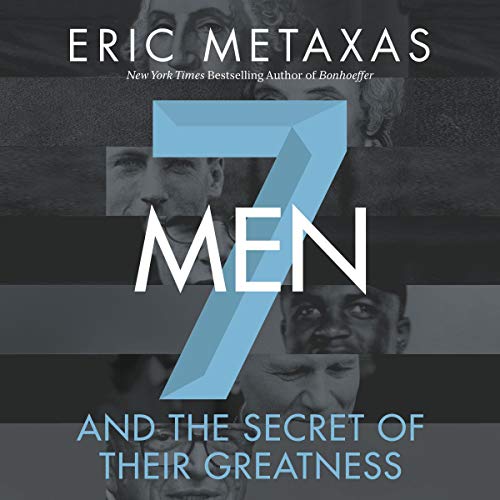Here is an age-old question -- what does it take to be considered a great man?
Best selling author, and the founder of Socrates in the City, Eric Metaxas presents seven men whose lives are worthy of examination.
The book is essentially a collection of short biographies, conveying each man's story and what makes them of particular note -- and arguably "great". A thread that runs through the lives of each of these seven is their faith, humility and perseverance. Metaxas is a man of faith so this common characteristic in the seven is no surprise. Each man's story is unique, yet these characteristics contributed to the remarkable lives they lived and consequently blessed others with. Like most of us, not every man's story is tidy and fit for Hallmark movies, and if you're like me, you'll enjoy this quick tour of seven great men not only for the learning and appreciation for the experiences of these men, but also because in learning about the trials of others, we are encouraged to press on in our own lives.
Here is my summary of Metaxas' comments, as I heard them as I listened to the book. Any errors here are my own, not those of Metaxas, and certainly not those of the men whom he profiles.
George Washington, the first POTUS (President of the United States). Naturally, much has been written about Washington, his life, his career, his many failures and contradictions (slave owner), his perseverance, and ultimately his prevailing against all odds.
A remarkable number of people, places and things are named after him! Searching Google for the term "Washington" yields over 1.5 BILLION results.
What makes Washington so great, and what every American should be thankful for, is that he willingly rejected the efforts of his peers to install him as a monarch. Imagine, winning tremendous victory and glory, yet cautiously leading a new nation for a season and then stepping aside. Had Washington taken the path of absolute power, it would have put in jeopardy the very thing he and so many others fought so hard to achieve. The great experiment of the United States, and by extension, every Democratic Republic (or "Democracy" if you prefer), may not have survived had he chosen otherwise.
"The establishment of our new Government seemed to be the last great experiment for promoting human happiness." -- George Washington
William Wilberforce, the British statesman whose decades long work was vital to the abolishment of slavery.
As a young man, Wilberforce was exposed to the Christian faith, but then had an extended season where he fully embraced the lifestyle of the rich young ruler, complete with exclusive private club membership, the equivalent of the Black Card Club of today.
Wilberforce re-engaged with his faith after being convinced by a colleage, and convicted by the Holy Spirit, of the veracity of the scriptures and the lordship of Christ. With this newly revitalized faith, Wilberforce steadily retreated from his life of ease and deliberated on what endeavor was worth the investment of his life's work. A spiritual mentor of Wilberforce was John Newton, the author of the famous hymn, Amazing Grace. Wilberforce could have pursued more policital power, but instead he chose to fight for freedom of people he would never meet.
"No one expects to attain to the height of learning, or arts, or power, or wealth, or military glory, without vigorous resolution, strenuous diligence, and steady perseverance. Yet we expect to be Christians without labour, study, or inquiry." William Wilberforce
Dietrich Bonhoeffer, pastor and revolutionary in Hitler's Germany.
Bonhoeffer came from a highly educated professional family yet at a young age felt called to study theology. As an adult, he was a major influence in the Confessing Church, which represented a church of true faith, resisting the nationalistic efforts of the German government to unify the church as an instrument of their political will.
Bonhoeffer's views brought him into conflict with the increasingly hostile government and when it became clear that he would be endangered by remaining in Germany, arrangements were made for him to travel to America to "wait out the conflict". The conflict however, was in his heart. No sooner did he arrive in New York but he returned to his homeland. When asked why he returned, he said that had made a mistake by leaving. This decision would ultimately cost Bonhoeffer his life as he was executed by hanging just days before the end of the war.
"The person who’s in love with their vision of community will destroy community. But the person who loves the people around them will create community everywhere they go." Dietrich Bonhoeffer
Jackie Robinson, the major league baseball player who broke the color barrier.
Robinson's path to the major league included a highly succcessful and diverse athletic career at UCLA, enlistment and subsequent installation as an officer in the US military after a little help from Joe Louis when Robinson's ambitions were thwarted by matters of race discrimination. There were even a handful of racially motivated brushes with the law in his youth.
Robinson had the talent to excel in major league baseball, but the question was whether he had the mental strength and character to withstand the anticipated vitriol from a community which was not willing to accept him. That was the question Brooklyn Dodgers executive, and fellow Christian, Branch Rickey wanted to answer. Rickey signed Robinson and after a stint in "the minor league", Robinson joined the Brooklyn Dodgers. The path was not easy but Robinson's skill and character paved the way for positive change in professional sports as well as numerous other parts of society. The teaching and practices of Robinson's mother, Mallie, bore fruit in her son's life. Robinson's mother taught her children to not return evil for evil, but as a Christian to repay evil with blessing.
"At the beginning of the World Series of 1947, I experienced a completely new emotion when the National Anthem was played. This time, I thought, it is being played for me, as much as for anyone else." Jackie Robinson
Pope John Paull II, head fo the Roman Catholic church from 1978 - 2005.
John Paul II, born Karol Wojtyła in Poland, was for many people alive today, *the* Pope because of the duration of his service, his visibility, and the way in which he was beloved by people of many faiths. He served at a time when world wide communications were shrinking the world in real-time. John Paul II was chosen to serve after the untimely passing of his predecessor, John Paul I. The youthful John Paull II took the same name as his predecessor in homage to him.
A world traveler, avid jogger and soccer fan, John Paul II was known for his warmth and ministry. His faith was on display the world over. For example, after an assisination attempt upon his life in 1981, he subsequently met with the would-be assassin and forgave him. John Paul II was outspoken on matters of religous freedom for people of all faiths, the benefits and sanctity of marriage, and for the protection of the lives of the unborn. In a world where power corrupts, John Paul II was a devout and humble servant leader. Perhaps like no other pope in recent history, John Paul II was remarkably strong in the convication of his faith yet progressive in his willingness to embrace change.
Despite his own personal battle with Parkinson's disease, John Paul II doggedly spoke against the use of embryonic stem cells in research, reinforcing his conviction of the importance of protecting human life.
"Freedom consists not in doing what we like, but in having the right to do what we ought." John Paul II
Eric Liddell, of Chariots of Fire fame, missionary, prisonar and olympic champion.
Liddell famously chose to honor his faith commitment to the Fourth Commandment of honoring the Lord by keeping the sabbath. In so doing, Liddell was unable to compete in his best event -- the 100 meter sprint. Unable to compete in the 100, he instead entered the 400 and against the odds, won the event. While the athletic achievements are noteworthy, Liddell's life story would not likely have been so impactful if not for this remarkable decision. When asked about his strategy for competition, the following quote is attributed to him: "The secret of my success over the 400m is that I run the first 200m as fast as I can. Then, for the second 200m, with God's help I run faster."
Chuck Colson, Marine veteran, attorney, federal prisoner (Watergate), founder of Prison Fellowship.
At first blush, some may question the inclusion of Colson among "the seven". After all, he is a convcted felon and is known for his involvement in the Richard Nixon adminstration and the Watergate scandal. Metaxas worked for Colson as a writer and got an upfront view of the man.
Colson's career, whether it was in the Marines, as an attorney, or as the founder of Prison Fellowship was marked by ambition. Ambition can be dangerous, but it is also something, when directed and led by the Lord, can transform society.
Shortly before his conviction, Colson put his faith in Christ. This faith broke barriers in the Washington DC community as faith is larger than party (or at least it used to be!). This faith also contributed to Colson's prison term as he refused to plead guilty to something he did not commit. His attorney was none too pleased at his stance! Colson received a multi-year sentence and spent over a year in prison.
After his release from prison, Colson had a vision of going back into the prison system to serve prisoners and their families. Prison Fellowship and Angel Tree were born out of this vision. God moved mightily in this ambitious convict turned champion for the hurting.
"I know the resurrection is a fact, and Watergate proved it to me. How? Because 12 men testified they had seen Jesus raised from the dead, then they proclaimed that truth for 40 years, never once denying it. Every one was beaten, tortured, stoned and put in prison. They would not have endured that if it weren't true. Watergate embroiled 12 of the most powerful men in the world-and they couldn't keep a lie for three weeks. You're telling me 12 apostles could keep a lie for 40 years? Absolutely impossible." Chuck Colson
Purchase on Amazon




